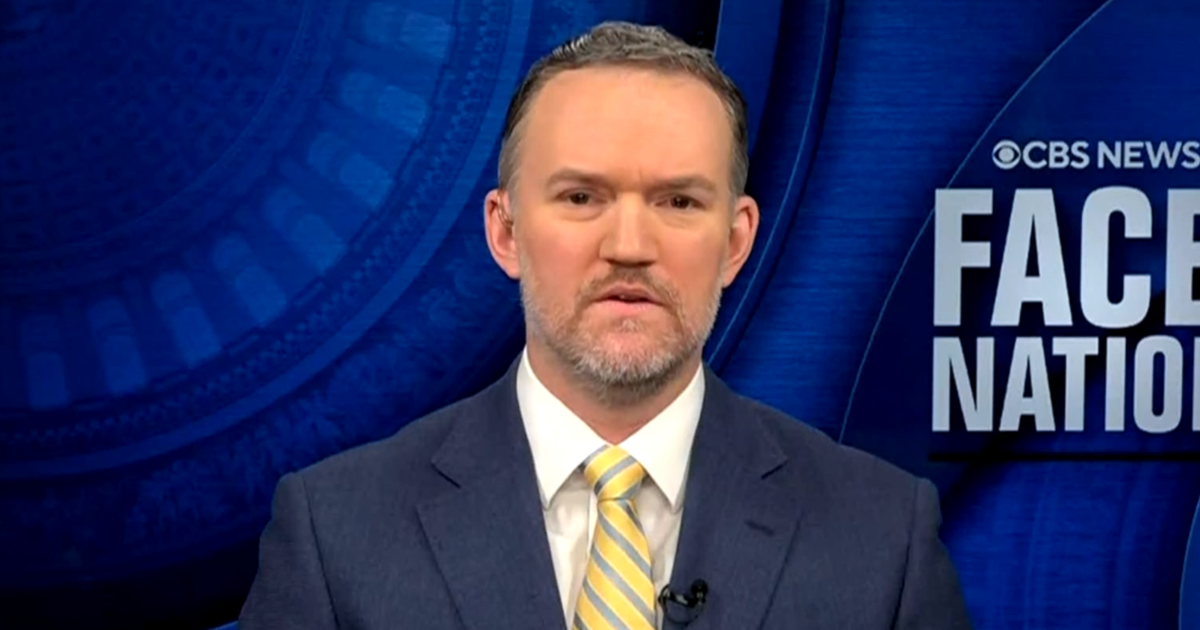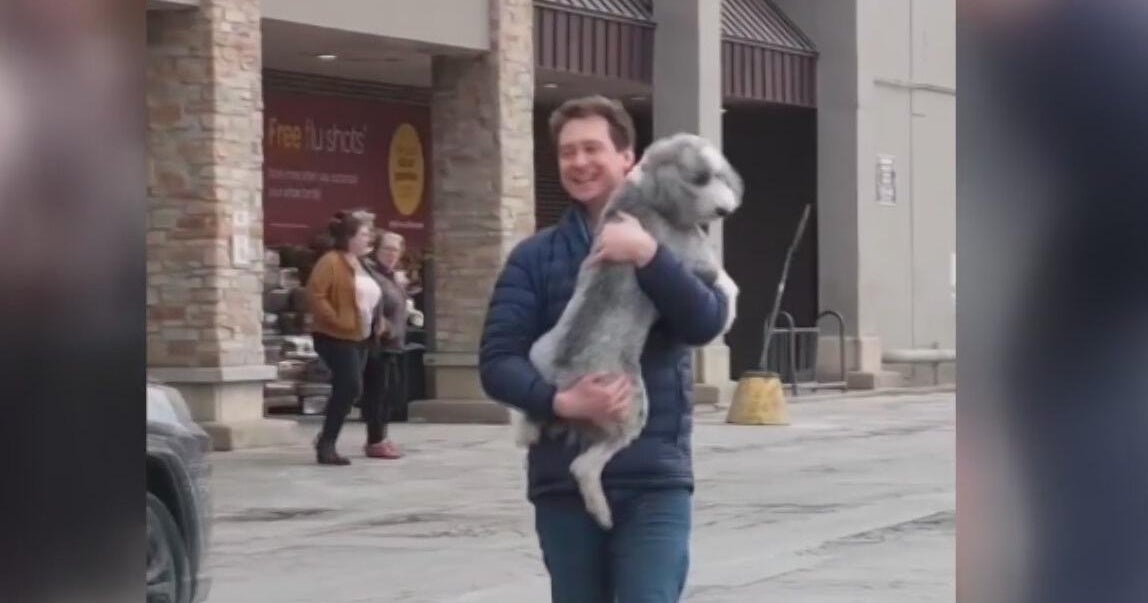Transcript: Scott Gottlieb discusses coronavirus on "Face the Nation," March 15, 2020
The following is a transcript of an interview of former FDA Commissioner Scott Gottlieb by CBS News' Margaret Brennan that aired Sunday, March 15, 2020, on "Face the Nation."
MARGARET BRENNAN: And we're back now with former FDA commissioner Dr. Scott Gottlieb. Good to see you here. Back for another week.
DR. SCOTT GOTTLIEB: Thanks.
MARGARET BRENNAN: And you've been telling us sort of what to prepare for next. And I want to dive into some of that with you. You heard Dr. Fauci say they're coming, but they're not really here yet in terms of kits and availability to actually go and have it processed if you need a test. What's the timeline?
DR. GOTTLIEB: Well, I think we're going to see a dramatic increase in diagnostic capability this week. So I think by the end of the week, tests are going to be readily available. They were- they approved tests on what we call high throughput systems, meaning systems that can run literally tens of thousands of tests a day inside academic labs or the large clinical labs like LabCorp and Quest. Once those facilities have those systems online, they're going to be able to process an awful lot of tests, and they'll have them online at some point this week. So by Friday, I think tests- testing is going to be pretty ubiquitous.
MARGARET BRENNAN: Now hospitals are trying to plan for the future here. How are they positioned? Are there enough medical supplies?
DR. GOTTLIEB: Not if we have a Wuhan style outbreak in a major city or multiple cities, which is my concern, that we can have outbreaks of that proportion in multiple U.S. cities. If you look at Wuhan at the peak--
MARGARET BRENNAN: A Wuhan style?
DR. GOTTLIEB: A Wuhan--
MARGARET BRENNAN: So you're saying the numbers that we are seeing and have seen in China?
DR. GOTTLIEB: Right. In- in a major U.S. city. Remember, Wuhan was the size of New York City. At the peak of that epidemic, they hospitalized about 20 thousand people. Ten thousand were in serious or critical condition and two thousand were intubated. To give you a basis of comparison, New York state, the entire state, has 50 thousand hospital beds and about three thousand critical care beds and about 20 thousand of those beds are in New York City. So if we have a Wuhan style outbreak in New York City, that's going to overwhelm the system. So they need to be building surge capacity right now in anticipation of that possibility. Now, there's ways to avert it, but that's the risk that we face right now.
MARGARET BRENNAN: Tens of thousands?
DR. GOTTLIEB: We'll certain- we'll hit- we'll certainly hit tens of thousands of cases in the U.S. Hopefully we won't hit hundreds of thousands of cases. But right now, if you look at some of the good research out of the Hutch by Trevor Bedford and others, they're- they're saying that there's probably 10 to 40 thousand cases right now distributed across the U.S. I think the risk that we have in the U.S. is we're a much more mobile population. China was able to confine their out- their epidemic largely to Wuhan. The risk here is that we have multiple cities that are seeded right now. And so we'll have multiple Wuhans. That's the bad case scenario.
MARGARET BRENNAN: Multiple Wuhans is an incredible thing to say. The Pentagon came out and put travel restrictions on U.S. troops traveling domestically. They can do something like that.
DR. GOTTLIEB: Right.
MARGARET BRENNAN: Do you expect to see other government agencies and should Americans be expected to essentially be on lockdown?
DR. GOTTLIEB: Look, there's no question that the steps we're taking right now or is changing the course of this epidemic. We're already impacting this. But I think we need to do much more. And so think steps like banning government employees from nonessential travel or state employees, that will have an additional impact. We need to be doing all of these things leaning very hard into this. The best case scenario is we look back a month from now and we say to ourselves, well, we overreacted. You want to be in a position and Dr. Fauci made this point as well. You want to be in a position to say we- we- we overreacted. It wasn't as bad as we thought it was going to be. But this is a once in a generation pathogen. We have never seen anything like this before in modern times. This is gonna- this is gonna be historic right now.
MARGARET BRENNAN: So should cities like Seattle and New Rochelle that are hot spots be on lockdown?
DR. GOTTLIEB: I don't think we can quarantine a U.S. city and lock it down and deny people their liberty in this country. I think what we can do is slow economic activity to a point where people have no place to go. If you close the theaters and you close the restaurants, you close large gatherings, you tell people not to have dinner parties, you tell businesses to have nonessential workers telework, people stay home. There's no place to go. I think that's the solution in the United States not to- not to put a city on lockdown. I don't think we're going to get there. We might. I hope not.
MARGARET BRENNAN: Is a- is what New York state doing a model for the rest of the country?
DR. GOTTLIEB: I think Andrew Cuomo has been leading very far ahead. I think he's been very aggressive in doing a good job. I'm concerned that the city hasn't closed public schools. Private schools are closed. Public schools are not.
MARGARET BRENNAN: Yeah.
DR. GOTTLIEB: And you do start to worry that people's ability to protect themselves is going to break along socioeconomic lines where lower income Americans will not have the same opportunities that middle wage and higher wage earners will because they can telework, they send their kids to private school, they're in suburban districts that closed.
MARGARET BRENNAN: Right.
DR. GOTTLIEB: That's got to be a concern.
MARGARET BRENNAN: And we will talk about that ahead with- with Larry Kudlow and others. But I want to take a quick break and come back. On the health risks, more conversation with Dr. Scott Gottlieb. And some of your questions answered ahead. Stay with us.
[COMMERCIAL BREAK]
MARGARET BRENNAN: Welcome back to FACE THE NATION. We are back now with more from the former head of the FDA Dr. Scott Gottlieb. And then we will take a look at the economic impact of the coronavirus crisis as lives across this country have changed in the course of this week. Doctor, we were talking about hospitals being basically able to help people if they get the virus or anything else. Are they going to be overwhelmed? We are starting to see things like pictures of tents set up outside of hospitals. Is that something other hospitals should be doing, either isolating or changing triage, or is this about simply not having enough beds?
DR. GOTTLIEB: Well, hospitals have emergency protocols, and they're implementing those right now. And that's very prudent, trying to build facilities to offload some of that capacity from the hospital onto other sites so that ERs don't get overrun. We have about a million hospital beds in this country, about 100,000 are critical care beds, 50,000 of those in medical intensive care unit beds. At any one time, most of those ICU beds are filled. And hospitals are about 78- 70 percent occupied. So we don't have a lot of excess capacity. We also don't have a lot of capacity with excess respirators. There is about 60,000 full-featured respirators in the country, about 8,900 in stockpile. So if we do have multiple epidemics in multiple large U.S. cities, the system will become overwhelmed. I think we can handle a- a Wuhan in one major U.S. city and pulse resources into that. What I worry about, again, is multiple cities having that kind of an outbreak.
MARGARET BRENNAN: Because if you don't have enough ventilators or other equipment, doctors have to start making choices about who gets what--
DR. GOTTLIEB: Unfortunately, there's about--
MARGARET BRENNAN: How do you do that?
DR. GOTTLIEB: --there's about 100,000 other ventilators that aren't full-featured ventilators, but could be used in a pinch. And so what we need to do is try to free up capacity right now. And that's what you see hospitals doing. And that's what they're doing with these tents and these surge facilities. They need to start discharging patients where they can, not doing elective procedures so they're not bringing in patients. These are hard economic decisions for the hospitals, but this is absolutely what they have to be doing. And we have time to do it. We- we do have three or four weeks if we're going to be on that trajectory that China was on to build that surge capacity right now. China did just about everything wrong leading into their lockdown and they still were able to get control of their- their epidemic there. We do have an opportunity now, but every day counts. Every day matters.
MARGARET BRENNAN: Is the White House listening to you? The president mentioned you by name this week.
DR. GOTTLIEB: Look, I've had- I've been fortunate to have the opportunity to talk to officials in the White House all through this. Some- some of the calls that I was making and the conversations I was having go back to January. They've been on top of this. I mean, they've been concerned about this. I've been talking to White House staff and the staff has been concerned about this. And so I'm going to continue to try to provide whatever help I can.
MARGARET BRENNAN: All right, Dr. Gottlieb, thank you.
DR. GOTTLIEB: Thanks a lot.
MARGARET BRENNAN: Good to have you with us once again.



